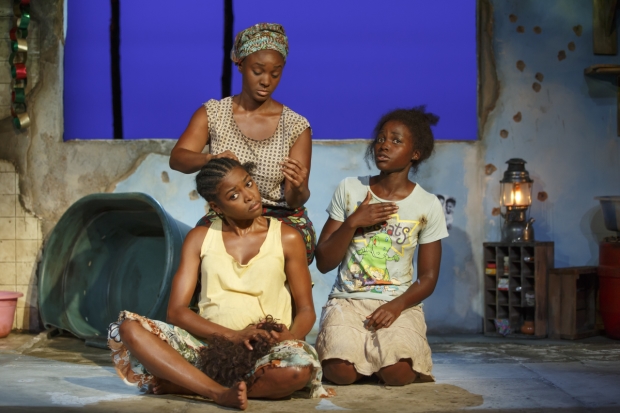Eclipsed
Danai Gurira takes us into the secret lives of women during the Second Liberian Civil War.

(© Joan Marcus)
You will probably never visit Liberia, but you will care deeply about the country and the people living in it after seeing Danai Gurira's engrossing new play Eclipsed, finally making its New York City debut at the Public Theater following a 2009 world premiere with D.C.'s Woolly Mammoth Theatre Company. Through truthful dialogue, compelling drama, and a shrewd sense of human nature, Gurira takes a very foreign situation and makes it intimately familiar to her audience.
The stage lights rise on a concrete shack with a corrugated iron roof. Cutouts from celebrity magazines share wall space with bullet holes and a large Liberian flag (evocative scenic design by Clint Ramos). This is the home of Helena (Saycon Sengbloh), Bessie (Pascale Armand), and a new arrival simply referred to as "The Girl" (Academy Award winner Lupita Nyong'o). They are three of the four wives of a commanding officer in the army of Liberians United for Reconciliation and Democracy (LURD), a rebel group that successfully fought for the ouster of President Charles Taylor during the Second Liberian Civil War (1999-2003).
While printed in the program, the women's names are not uttered onstage until the play's final moments. Instead, they refer to one another by the numerical order in which they became wives to the commanding officer. Helena is number one, Bessie is number three, and the girl (whose real name we never learn) is number four. The missing second wife, Maima (the alluring and dangerous Zainab Jah), has taken up a gun and become a soldier in her own right.
Ramos (who also designed the costumes) outfits Maima in fashionable jeans and name-brand shirts. Hair designer Cookie Jordan gives her long highlighted braids. She looks like 2014 Beyoncé with a Kalashnikov rifle — a glamorous advertisement for a deadly war. This becomes especially important as number two tries to seduce the newest wife into joining her on the battlefield. Carrying a gun and enjoying the stylish spoils of war certainly beats hanging out in her Rugrats T-shirt as wife number four.
The costumes are just one small example of how director Liesl Tommy has enhanced the entire production with her sly attention to detail. The subtle power dynamics between the women are crystal clear: As the oldest, Helena wields the most control over the operations of the home. As the newest addition, number four receives the most sexual attention from the commanding officer. That leaves poor Bessie in the middle, pregnant and ignored (Armand turns what could be a comic-relief role into a compelling dramatic narrative). Number four sees where she's headed and it terrifies her.
Thanks to Tommy's comprehensive direction, the shack becomes a self-sustained ecosystem with its own rules and customs. It's very clear that the women know little of life outside of this conflict. Helena refers to the first Liberian Civil War (1989-97) as the "first world war." Scant radio reports and a worn copy of a Bill Clinton biography are their only sources of information about the world beyond this little house on an army base, one of many full of similarly desperate housewives.
The arrival of a Monrovia-based peace activist Rita (Akosua Busia with a posh accent that contrasts wildly with the Liberian-English used by the other women) signals hope for an end to hostilities while also hammering home what a raw deal the women have been handed: The male soldiers don't dare molest the rich city women who have arrived to petition for peace, yet they feel perfectly comfortable taking poor village girls and enslaving them as third and fourth wives.
Under this oppressive status quo, names take on an almost sacred importance as a symbol of agency. Number two rechristens herself "disgruntled" after she takes up arms: Her name signifies her power. The women in the shack just remain numbers. It's little wonder that number four wants to escape this dead-end situation.
As the youngest wife, Nyong'o brings us along on her journey with a performance that is gripping and emotionally raw. We watch her transform from victim to oppressor, wondering if she's just being victimized in a whole new way as a cog in a larger machine of injustice. As Helena, Sengbloh heart-wrenchingly embodies the saddest yet most hopeful storyline in Gurira's multifaceted script. She has committed the most years to this lifestyle (taken at the outset of the first civil war and never freed) and doesn't know much else. The war has simultaneously stolen her life and given her meaning; when that struggle ends, her struggle to start a new life will begin.
With its exploration of a wartime society governed by fear and desperation, Eclipsed is reminiscent of Brecht's Mother Courage. But rather than preaching from a pulpit (as Brecht often did), Gurira asks us to come to our own conclusions by presenting believably idiosyncratic characters in truthful situations. That turns out to be a whole lot more satisfying and thought-provoking.








